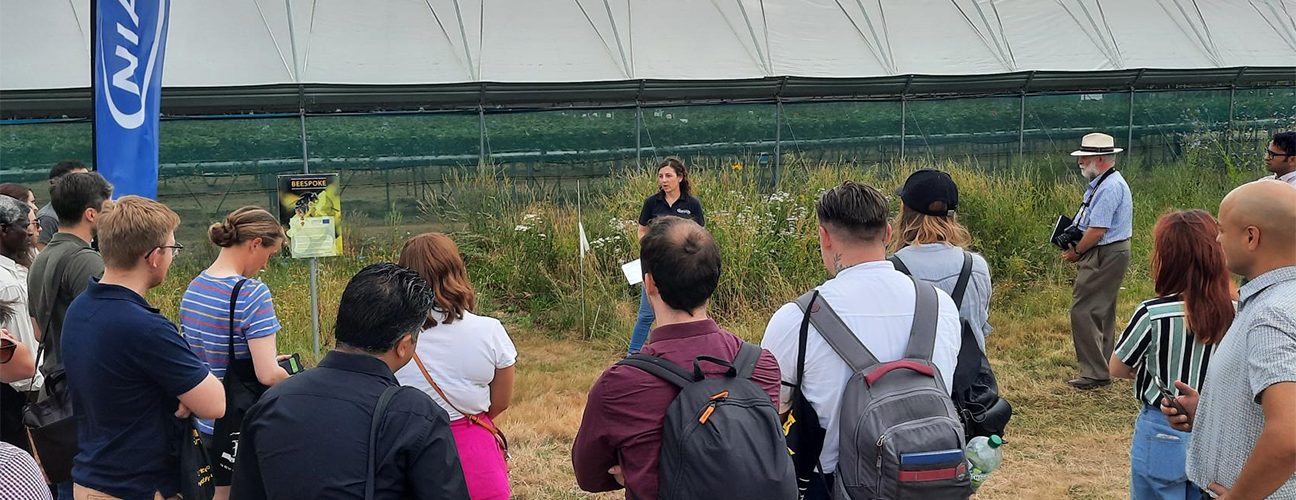Creating farmland homes for wild bees
The BEESPOKE project set out to increase levels of pollinators using local- and landscape-scale approaches, thereby contributing to the development of sustainable and resilient agroecosystems.
Around 80% of crop and wild-flowering plants depend on animal pollination. However, pollinators are in decline across Europe due to the loss of flower-rich habitats, climate change, pollution and more. BEESPOKE is an EU-funded Interreg North-Sea Region project, including the UK, Belgium, Netherlands, Germany, Denmark, Sweden and Norway, that set out to find solutions and incentives to support wild pollinators.
BEESPOKE specifically focused on creating habitats for the right pollinators on farmland. The types of pollinators needed differ depending on the crop; solitary bees, for example, are better at pollinating apples, whereas beans need bumblebees. To address this diversity, the project produced seed mixes for flower plots which are tailored to the context. The mixes contain seeds for native flowers which attract the key pollinators for the crops that the farmer is growing, while not supporting their pests.
John Holland, project coordinator, says “We wanted to encourage farmers across the North-Sea Region to plant more wildflower areas. Supporting pollination can positively affect crop yield quality and farm income.” During the project, over 300 new flower plots were created on participating farms to demonstrate and evaluate the benefits of the BEESPOKE wildflower seed mixes for wild bees and the crops they pollinate. This covered eight crop types which are commonly produced in the North Sea Region, including apple, pear, strawberry, sweet cherry, raspberry, blackcurrant, oilseed rape, and broad bean.
The mixes are attractive to a wide array of pollinators, other beneficial insects, and overall biodiversity. The beneficial insects included insects that help control crop pests, demonstrating that the flower mixes also have additional benefits for crop production.
One of the mixes is a grassland seed mix, containing herbaceous flowering plants that not only support bees, but also provide nutritious forage for livestock, especially in dry summers. Nils von Deetzen, livestock farmer from Germany, saw an immediate difference in his fields “There are now always butterflies or bees. Always when you walk through these areas you see pollinators, which you would not have seen before.” He also noticed new types of birds feeding on the insects that were attracted by his flowering plants, demonstrating how he is supporting the ecosystem.
Alongside these seed mixes, BEESPOKE also developed guidelines and training for farmers. A wide range of materials includes guides on monitoring the numbers and diversity of pollinators, and on estimating pollination potential. These help to gain valuable insight into the relationship between crop yield and pollination.
Two online tools help land managers assess pollination by wild bees, predict the effect of adding extra habitats, and choose the best flower mix to enhance pollinators. John Holland again: “Selecting the most appropriate wildflower seed mix for a locality is crucial. Environmental factors such as soil type and shade can be highly influential on which species will thrive. Thanks to the project’s results, we have created a database of plants used by pollinators, and an online seed selection tool so that farmers can develop their own mixes suited to their requirements and locality.”
Through feedback from stakeholders and project activities, the project compiled and publicised a set of policy recommendations to encourage pollinators. This includes recommendations on how to improve agri-environment schemes from farmers’ point of view.
John Holland concludes: “It is estimated that insect pollination is worth €15 billion in the EU, it is essential for ensuring a supply of food, and maintaining sustainable and resilient agroecosystems. The BEESPOKE approach empowers land managers to adopt pollinator management as a routine practice, fostering a bottom-up approach, creating a legacy to ensure continuing improvements for insect pollination of food crops in the future.”
See more on our project page for BEESPOKE – https://agricology.co.uk/research-projects/beespoke/
